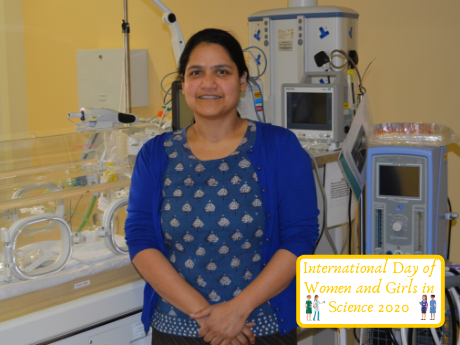'We have an opportunity to make a difference' - Dr Shalini Ojha

Tuesday 11 February marks International Day of Women and Girls in Science 2020, which is a day to promote full and equal access to and participation in science for women and girls.
We will be sharing the stories of some of the extraordinary women in science whoo are working within research at the Trust.
Dr Shalini Ojha - Consultant Neonatologist
Shalini trained as neonatologist in India and the UK and during the course of her clinical and academic training developed a keen interest in early life nutrition. She is passionately committed to finding ways to improve childhood nutrition with an aim to improve the life course of the future generation.
After completing a PhD in Child Health, she joined the University of Nottingham in 2015 as a Clinical Associate Professor in Neonatology and a Consultant Neonatologist at the University Hospitals of Derby and Burton NHS Trust.
Her research work focuses on infants who are "born too soon" i.e. premature. She is currently leading the National Institute of Health Research funded multi-centre randomised controlled trial investigating the optimal method of feeding infants who are born 8-10 weeks early.
This study is already running in 15 hospitals across the UK and will include a total of 40 centres. In this and other similar work, Shalini believes in working with parents and families of preterm infants to enable them to be the voice that leads doctors and scientists in finding new ways to improve quality of care for their babies.
Shalini runs a doctoral programme and supervises UK and international PhD students at the University of Nottingham. She contributes to teaching at the University's Graduate Entry Medical School in Derby. She is a passionate supporter of equal representation and promotion in science because she believes that when we irrationally discriminate due to criteria such as gender, race, or disability, we fail to utilise valuable talents that when nurtured, will contribute to the betterment of all. While she is delighted to celebrate the International Day for Women and Girls in Science, she hopes that very soon, such days will no longer be required.
